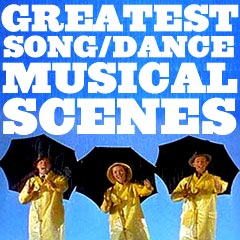|
Greatest Song and Dance Musical Moments and Scenes
|
| G (continued) |
|
Title Screen
|
Movie Title/Year and Scene Descriptions |
Screenshots
|
|
Lost Film
|
Gold Diggers of Broadway
(1929)

One of the earliest, most successful, and most ambitious
Warners' musicals using the Vitaphone process, this two-toned Technicolor
film (touted as a "talking and singing natural color picture")
was the first of the talkie "Gold Digger" films
(although it was a remake of the silent film Gold Diggers (1923) -
based on the 1919 hit play), and the second all-color talkie.
Only
portions of this landmark film now exist.
Some of the existing footage
consists of the music of Nick Lucas (as Himself), including the first rendition
of Tip-Toe Thru' the Tulips (pictured), and In a Kitchenette.
Winnie Lightner sang Mechanical Man.
The most elaborate
production number was Painting the Clouds with Sunshine (pictured). |
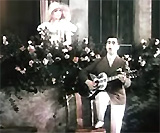
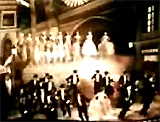
|
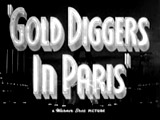
|
Gold Diggers in Paris (1938)

This was the fifth and last "Gold
Diggers"
film, after films in 1929, 1933, 1935, and 1936.
The dance productions in this Warner Brothers picture
were staged by Busby Berkeley, but they were less memorable set-pieces
due to slashed budgets.
The musical numbers were sung
by radio star and crooner Rudy Vallee (Vallee replaced Dick Powell,
who turned down reprising his role, as Club Bali nightclub owner
Terry Moore) who fondly impersonated Maurice Chevalier and FDR.
Musical numbers included:
- A Stranger in Paree (pictured) (on a Parisian
bus, sung by Vallee and Rosemary Lane in the role of star ballet
pupil Kay Morrow)
- the memorable I Wanna Go Back
to Bali (pictured twice) (sung by Rudy Vallee in a navy uniform
and pretty garlanded showgirls in tropical outfits)
- The Latin Quarter (pictured twice)
dance number in the finale, including the sequence in which a
gigantic Navy officer's cap descended and covered over the dancers
on the set
|
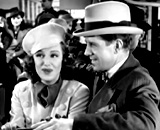
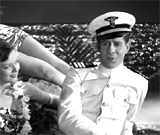
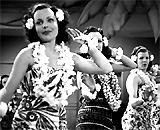
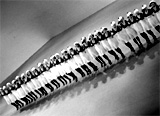
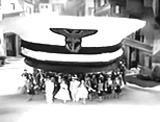
|
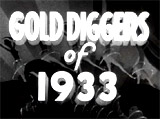
|
Gold Diggers of 1933 (1933)

This was the biggest and most dazzling of the "Gold
Digger" films and featured more extravagant Busby Berkeley
numbers - this was the second Warner Bros. backstage musical
of 1933 - the briskly-told musical directed by Mervyn LeRoy included
the following numbers, with song and dance choreography by Busby
Berkeley:
- in the opening number, the sight of chorine Fay
Fortune (Ginger Rogers) wearing a skimpy, glittering coin-covered
costume and singing in pig-Latin (just undecipherable nonsense
syllables set to the music that was a fad at the time) with other
coin-covered chorines dancing to We're In the Money with
massive money-related sets and over-sized coins
|
"We're in the Money"
|
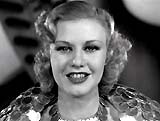
|
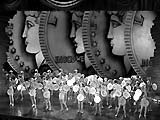
|
- the exquisitely-choreographed, elaborate Shadow
Waltz production number in which neon-lighted dancers created
elaborate, glow-in-the-dark geometric shapes -- highlighted by
a gigantic white violin formed by the dancers in an overhead shot,
complete with a strumming bow and violins illuminated by neon tubing
|
"Shadow Waltz"
|
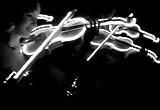
|
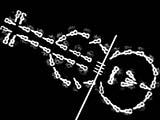
|
- also the naughty pre-Code Petting in the Park number
featuring straw-hatted men romancing chorines on a lawn - with
the camera leering at their crossed legs and petticoats, followed
by a drenching rainstorm forcing the chorines to provocatively
strip in silhouette behind a transparent screen as a lascivious,
leering young boy (midget Billy Barty) pulled up the screen
- the most-remembered, show-stopping finale number,
introducing streetwalking prostitute Carol King (Joan Blondell)
under a street lampost, saluting the unemployed, poverty-stricken
war veterans suffering from the Depression who demanded to be paid
a $1,000 bonus promised in 1925, with other affected tenement housewives
in the sobering song Remember My Forgotten Man - concluding
with silhouettes of marching soldiers (on a half-wheel)
|
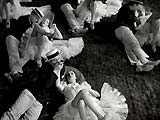

"Petting in the Park"
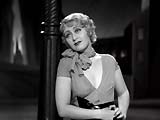
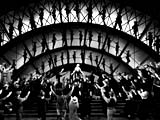
"Remember My Forgotten Man"
|
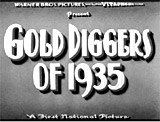
|
Gold Diggers of 1935 (1935)

 Best
Original Song: Lullaby of Broadway Best
Original Song: Lullaby of Broadway
This Busby Berkeley choreographed-directed
film (in his debut as a solo director) featured two major production
numbers (sequences somewhat detached from the surrounding plot) exemplifying
his masterful trademark camerawork. This film's sole Oscar nomination
and win was for Best Original Song (Lullaby of Broadway).
The two major production numbers (sequences somewhat
detached from the surrounding plot) in this film, from choreographer-director
Busby Berkeley (in his debut as a solo director), and considered
his best work, were the following:
- the scene of a moonlight ride in a motorboat, while
the tune "The Words Are in My Heart" was sung by medical
student/desk clerk Dick Curtis (Dick Powell) to heiress Ann Prentiss
(Gloria Stuart), featuring 56 mostly-blonde, white evening-gowned
chorines pretending or 'play' waltzing/dancing with white baby-grand
pianos that formed geometric, kaleidoscopic arrangements and ultimately
came together to form one giant piano top (the lightweight piano
shells were moved around by black-clad men manuevering the pianos
on their backs while following tape markings on the shiny black
floor)
- the climactic approx. 14 minute finale "The
Lullaby of Broadway" - a self-contained film within a film
- pictured as a day in the life of the Great White Way of New York,
with its opening shot (in a dark frame as the camera approached)
of the lit, disembodied and upturned white head or face of Wini
Shaw (Herself), as she was singing 'The Lullaby of Broadway' in
solo; the image was followed by her head twisting around, inverting
and reclining - and the shape of her silhouetted face dissolving
into an aerial shot or mapping of the island of Manhattan
|
"The Lullaby of Broadway" - 1
|
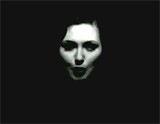
|

|
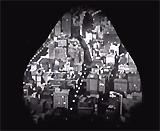
|
- Wini - a "Broadway babe" was returned
home to her walk-up tenement apartment with her date, exhausted
from a night of partying; she would sleep all during the day as
her proletarian neighbors were leaving for work, and then would
go out again in the early evening for more dazzling nightlife throughout
the next night
- the show-stopping, entertaining, inventive production
number continued in an art-deco nightclub (Club Casino) where Wini,
the following night, was the only patron watching the club's all-night
show (a single dancing couple on gargantuan stepping stairs-platforms),
accompanied by a wealthy date (Dick Powell); the dance couple was
joined by rows and rows of hundreds of tap-dancing couples, highlighted
by the acrobatic dancing of a trio (led by Manny King) filmed in
part through the glass floor - performed to the pounding rhythms,
and visualizing a sexually-charged battle of the sexes (with obvious
sexual imagery) in the hedonistic, nocturnal city during the Depression
years; Wini and her date joined in the dancing
|
"The Lullaby of Broadway" - 2
|
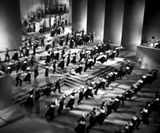
|
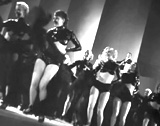
|
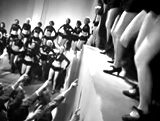
|
- during the dance portion, the number turned into
a mordant, judgmental and cautionary tale of life in the city for
party-girl Wini after another night of carousing on Broadway; from
the stage, Wini ran into her balcony doors (breaking the 4th wall
of reality), as throngs of entertainers from the stage floor crowded
behind her to rush in after her; as the group of dancers surged
toward her, the camera angle reversed and she appeared to be on
her skyscraper balcony, where she was accidentally pushed backwards;
the camera twirled around as she descended to the street; but was
it only a dream (?) when she again appeared restored as a disembodied
head to finish singing the number's title song
|
"The Lullaby of Broadway" - 3 - Wini's
Plunge From Balcony
|
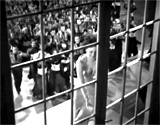
|
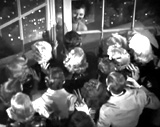
|
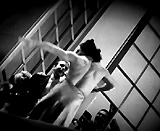
|
|
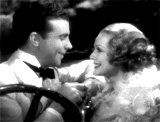
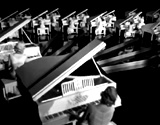
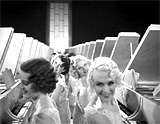
"The Words Are In My Heart"
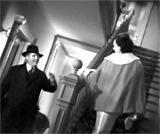
Wini Returning Home to Walk-Up Apartment in Early AM
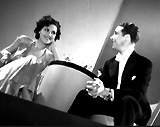
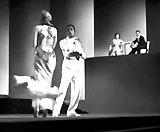
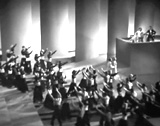
Wini with Date (Dick Powell) Back the Next Night
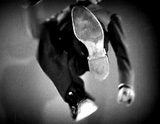
Acrobatic Dancing of Manny King Viewed From Below the Floor
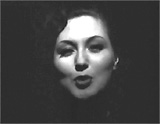
The Final Chorus
|
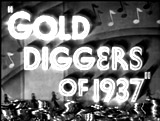
|
Gold Diggers of 1937 (1936)

This was another of the expensive
Warner Brothers films in the Gold Diggers series of five musicals.
Busby Berkeley's
closing production number All's
Fair in Love and War (pictured twice), the
best in the film, featured Joan Blondell leading a chorus of dozens
of helmeted, drum-playing, flag-carrying females dressed in frilly
white military uniforms (against a shiny black floor) as they tapped
their way through a series of military formations and flag-wavings
with Berkeley's trademarked geometric patterns.
Another of the production numbers, Let's Put
Our Heads Together (pictured), presented chorines at a summer garden
party in fifty big, white rocking chairs - each with a beau. |
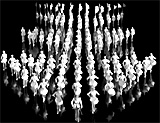

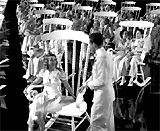
|
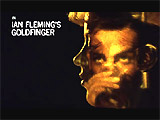
|
Goldfinger (1964)
 #
53 "Goldfinger" #
53 "Goldfinger"
The third 007 film had only one winning Oscar: Best Sound
Effects Editing (it was the first Bond film to be nominated
(and win) an Academy Award). It was also the second Bond film to use
a pop star (Shirley Bassey) to sing the theme song Goldfinger during
the titles.
Following the gun-barrel opening (with stuntman Bob Simmons)
in this James Bond action film, there was a long pre-title credits
action sequence of Bond (Sean Connery) completing a previous mission
in Latin America. He caused sexy nightclub dancer Bonita (Nadja
Regin) to be knocked out in her bathtub, and then electrocuted drug-smuggling
thug Capungo (Alf Joint) in Bonita's bathtub
with a round electrical heater fan.
The stirring credit sequence title song Goldfinger (pictured)
then followed, performed by Shirley Bassey, with memorable lyrics
about Bond's newest villain, rich, greedy, gold-smuggling villain
Auric Goldfinger (Gert Frobe):
Goldfinger He's the man, the man with the Midas touch.
A spider's touch, such a cold finger beckons you to enter his web
of sin. But don't go in. Golden words he will pour in your ear, but
his lies can't disguise what you fear. For a golden girl knows when
he's kissed her, it's the kiss of death from Mister Goldfinger. Pretty
girl, beware of this heart of gold This heart is cold....He loves
only gold Only gold He loves gold He loves only gold Only gold He
loves gold.
|
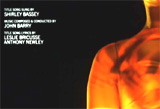
|
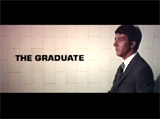
|
The Graduate (1967)
 #
6 "Mrs. Robinson" #
6 "Mrs. Robinson"
Mike Nichols' classic 60's generation-gap comedy was
complemented by a musical soundtrack written and sung by the
pop duo group of the time, Simon & Garfunkel from their
Grammy-winning The
Sounds of Silence album (with songs composed earlier and previously-released
except for Mrs. Robinson), with meaningful, haunting lyrics
amidst koo-koo-kachoo sounds, to enhance the film's moods and themes.
However, unlike most soundtracks, all of the tunes only served as background
music.
[Note: Mrs. Robinson was ineligible to be nominated
for the Academy Award for Best Original Song, because it was not
written exclusively for the film in which it appeared.]
The opening title-credits sequence was of young,
recent college graduate Benjamin Braddock (Dustin Hoffman) on a plane
'descending' into LA, returning home from college in the East. Appearing
slightly shy and unprepossessing, his face had a blank, expressionless,
enervated, zombie-like look. While standing mute
by himself on the automated, moving walkway (with a monotonous recording: "Please
hold the handrail, and stand to the right. If you wish to pass, please
do so on the left") at the busy LAX airport, the credits played
as The Sounds of Silence (pictured) was heard on the soundtrack,
reinforcing the theme of his emptiness and alienation from his surroundings:
"...And in the naked light I saw, ten thousand people,
maybe more.
People talking without speaking, people hearing without listening.
People writing songs that voices never shared, no one dared disturb
the sound of silence..."
The scene of the retrieval of his luggage from a mechanized
conveyor belt, and his disappearance into the terminal's crowd and
to the outer doors dissolved into the next scene. Benjamin was in his
upstairs bedroom in his upper-middle-class parents' home. He sat staring
blankly ahead, positioned in his room in front of his aquarium tank
(while observing its occupants) and wanting to be alone with his thoughts.
Although much of the film was involved with the affair
Benjamin conducted with lecherous, close family friend Mrs.
Robinson (Anne Bancroft), the song Here's to You Mrs. Robinson (pictured)
- with a strumming guitar - was not heard until late in the film:
"And here's to you, Mrs. Robinson Jesus loves you more
than you will know (Wo, wo, wo) God bless you please, Mrs. Robinson
Heaven holds a place for those who pray (Hey, hey, hey...hey, hey,
hey)"
It was during Benjamin's frantic search to rescue girlfriend
Elaine Robinson (Katharine ) from her impending marriage in Santa Barbara
(he first drove in his convertible Alfa Romeo Spider red sports car
to Berkeley from LA, and then turned around to drive back down the
state). |
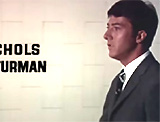
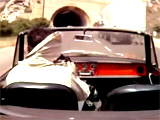
|

|
Grease (1978)

 #
70 "Summer Nights" #
70 "Summer Nights"
This immensely popular screen musical directed by Randal
Kleiser was the longest-running Broadway show in history by 1979.
The film was highly influential as a teen flick,
and led to similar films, such as Fame (1980), Footloose
(1983), Flashdance (1984), and Dirty Dancing (1987) in
the next decade.
Many of the catchy numbers ("Grease
is the word!") set
in a 50s high school (with overaged students) were sung by 29 year-old
John Travolta and sweet-voiced 24 year-old Australian singer Olivia-Newton
John as rebellious Danny Zuko and good girl Sandy Olsson respectively,
including:
- her wistful and lamenting Hopelessly
Devoted to You (pictured), sung one night when she sat on
her outdoor porch in her white nightgown
- the wild, profanity-laced
ode to the muscle car of Danny's dreams -- Greased
Lightning (pictured): ("Well this car is systematic, hydromatic,
ultramatic - Why, it could be Greased Lightnin'!")
- their infectiously-sing-along-to
paralleled duet Summer Nights (pictured twice) in which the
couple (Danny and Sandy) presented their own versions of their summer
romance to friends: ("Summer
lovin' had me a blast - summer lovin', happened so fast, I met a
girl crazy for me - I met a boy, cute as can be, Summer days driftin'
away, to uh-oh those summer nights, Tell me more, tell me more, did
you get very far? Tell me more, tell me more, like, does he have
a car?")
The showstopping finale was You're
the One That I Want (pictured) at a graduation school carnival,
with Olivia Newton-John in tight, black leather pants that literally
had to be sewn onto her, followed by the ensemble cast singing We
Go Together (pictured),
and ending with the two flying away (!) in Greased Lightning. |
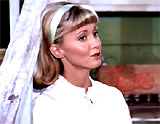
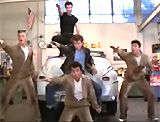
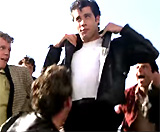
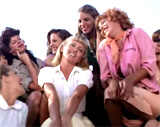
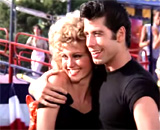
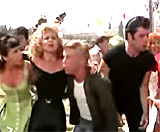
|
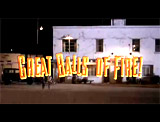
|
Great Balls of Fire! (1989)
This musical biopic was highlighted by Dennis Quaid's
virtuoso impersonation of controversial rocker Jerry Lee Lewis (Quaid
did his own piano playing but lip-synched the lyrics), and the memorable
singing of the title song Great Balls of Fire (pictured) on
a blazing piano. |

|
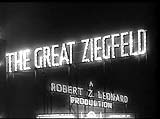
|
The Great Ziegfeld (1936)

This Best Picture-winning, lavish MGM episodic biopic
of the showman Flo Ziegfeld (portrayed by William Powell) included
elaborate, mechanical camera-work production numbers (matching Busby
Berkeley's productions).
Its most famous sequence included a fabulous crane
shot of a slowly-spinning, cork-screwing tower of stairs holding
singers, musicians, and other artists.
Also,
it featured the fictional and real-life portrayals of past Ziegfeld
Follies greats, including Fanny Brice, Will Rogers, and Eddie Cantor.
Gargantuan or massive production
numbers and spectacular songs included:
- the expensive Academy Award-winning dance number
just before the Intermission -- Irving Berlin's A
Pretty Girl is Like a Melody (pictured often) - it was filmed
in one continuous shot and featured 180 performers - including
Ziegfeld chorine showgirl Audrey Dane (Virginia Bruce) perched
atop the giant revolving platform or pillar
- the closing segment You Never Looked So Beautiful (pictured) with the title song sung by Audrey Dane with tuxedoed
men, followed by a fashion show, of sorts, with many poses of numerous
chorines wearing extravagant costumes and headdresses, ending with
a close-up of Audrey Dane
|
"You Never Looked So Beautiful"
|
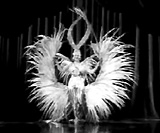
|
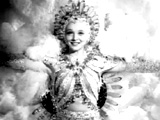
|
|
Chorine with Headdress and Costume
|
Audrey Dane (Virginia Bruce)
|
|
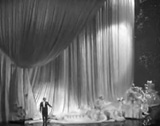
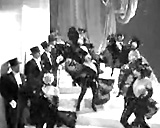
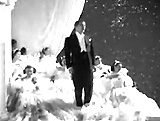
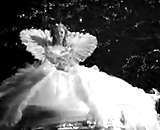
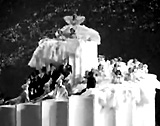
"A Pretty Girl is Like a Melody"
|
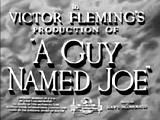
|
A Guy Named Joe (1943)
In the original MGM film (before Spielberg's remake Always
(1989)), civilian cargo pilot Dorinda Durston (Irene Dunne)
tenderly sang to her reckless and carefree heroic pilot lover Pete
Sandidge (Spencer Tracy):
- I'll Get By (As Long as I Have You) (pictured
three times)
As she crooned, he lovingly gazed into her eyes, and
then she danced with him, while pal Al Yackey (Ward Bond) played
a harmonica.
The tune served as the thematic leitmotif for the love
between the two. |

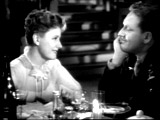
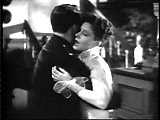
|
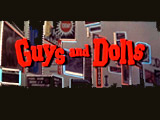
|
Guys and Dolls (1955)

 #
42 "Luck Be a Lady" #
42 "Luck Be a Lady"
This Samuel Goldwyn's production
(directed by Joseph L. Mankiewicz), a crime-related musical, was developed
from a 1933 short story titled "The Idyll of Miss Sarah Brown" by
writer Damon Runyon about a NY sharpster and a missionary girl, and
was released by MGM in the mid-50s. It was the big screen version of
the story adapted from the long-running 1950 Broadway musical play,
and featured marvelous Michael Kidd-choreography. Gene Kelly was supposed
to play the main male role, but MGM refused to loan him to Goldwyn
Studios. It was the 5th highest-grossing film of 1955 at $6.8 million.
The film's plot told
of slick big-city gambler Sky Masterson
(a slightly miscast Marlon Brando in his musical debut - who sang
with his own voice) who made a $1,000 bet that he could successfully
romance/seduce "Save A Soul" missionary Sgt. Sarah Brown (Jean Simmons),
in exchange for helping to save her Mission.
- the opening scene was set in bustling NYC's Times
Square with tourists, street vendors, bobby-sox wearing teenaged
girls and other street hustlers, drunks, and gamblers; a threesome
of small-time betters Nicely-Nicely Johnson (Stubby Kaye), Benny
Southstreet (Johnny Silver) and Rusty Charlie (Danny Dayton) with
scratch-sheets sang the opening number "Fugue for Tinhorns," as
they shared tips on betting for three front-running horses just
before race time: ("I got a horse right here / His name is
Paul Revere...")
- at the same time on another street, "Save
a Soul" Mission and Salvation Army-like missionary Sgt./Sister
Sarah Brown (Jean Simmons) was singing "Follow the Fold" with
her Mission's band - she was delivering an anti-gambling sermon
to bystanders in an apathetic crowd
- in the main story, Broadway denizen and financially-challenged
gambler Nathan Detroit (Frank Sinatra) was known for organizing
and running "The Oldest Established Permanent Floating Crap
Game" in New York; Nathan was struggling to find a new venue
or location to run his unlicensed, long-running, famous, high-stakes,
illegal gambling crap game that moved from location to location
to avoid prosecution; he was facing pressure and intense "heat" from
NYPD Lieutenant Brannigan (Robert Keith)
- at the same time, Nathan's frustrated and wacky
girlfriend-fiancee (to whom he had been engaged for 14 years) -
star performer and singer at the Hot Box Club Miss Adelaide (Vivian
Blaine), kept pressuring him to finally get married, and to quit
his gambling enterprise and become a normal businessman
- Nathan met up with an old acquaintance - slick,
high-rolling, free-wheeling, big-city gambler Sky Masterson (Marlon
Brando) at Mindy's Restaurant; Sky claimed
that all women were alike: ("Figuring weight for age, all dolls
are the same....as far as the eye can see"), and boastfully
claimed he could convince any female to join him for a dinner date
in Havana the next day; Nathan tempted Sky
with a $1,000 dollar bet - that he couldn't successfully romance/seduce
Nathan's choice of any "doll" as his date in Havana;
after Sky accepted the bet, Nathan pointed out through the window
an unlikely doll as Sky's date - the prudish, virginal, ultra-religious
and straight Sister Sarah Brown from the Mission
- after meeting Sarah, Sky proposed a trade to help
her out - he would give Sarah his marker (a written IOU pledge
or guarantee) that he could recruit a dozen genuine sinners into
her Broadway-branch Mission two days later for her Thursday-midnight
prayer meeting: ("I am in a position
to supply you with the raw material you need for your work, namely
sinners"); in exchange, she would agree to have dinner with
him the next night; they both shared
in the singing of "I'll Know" (about the right
partner coming along); afterwards, he grabbed
and kissed her; after a short delay, she slapped him hard across
the face, and ultimately declined his invitation
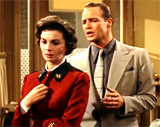
|
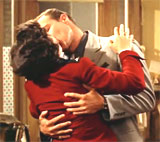
|
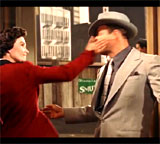
|
|
"I'll Know" - Followed by
Sky's Unwanted Kiss and Sarah's Slap
|
- the title song - "Guys and Dolls" -
was sung by Nathan with his two cohorts Nicely-Nicely and Benny Southstreet
while walking down the street, about how "guys" all over the world often fell
in love with
"dolls": ("The guy's only doin' it For some doll")
- when Sky arrived to pick up Sister Sarah the next
day to fulfill his bet - a dinner date in Havana with Sarah, she reversed
herself and changed her mind, and she gladly accepted Sky's offer
for a date, and promised a guarantee to her regional director General
Cartwright (Kathryn Givney) that there would be at least 12 genuine
sinners in her mission the following evening, to avoid having the
Mission shut down
- in the evening in Havana during their dinner date,
Sarah had loosened-up after some spiked milk drinks, and then
later sobered up next to a pool of water near a church bell that
was ringing in a courtyard; she openly revealed her feelings of
happiness and love for him as she sang: "If I Were a Bell": ("Ask
me how to describe This whole beautiful thing Well, if I were a
bell I'd go ding-dong-ding-dong..."); she fell
into his arms for embraces and a kiss as the song ended
- once they returned to New York by plane at dawn,
they took a taxi to Times Square and walked to the front of her
Save-A-Soul Mission, where Sky and Sarah sang a duet together
"A Woman in Love" about their newfound, reciprocal love:
("Your eyes are the eyes Of a woman in love And, oh, how they
give you away...Your eyes are the eyes Of a man who's in love")
- their love for each other was challenged when she
was accused of allowing gamblers to assemble in her Mission for
one of Nathan's crap games during her absence; she blamed Sky for
using her and setting her up; however, Sarah's uncle Arvide Abernathy
(Regis Toomey) tried to convince Sarah
that Sky had nothing to do with setting up the "filthy crap
game"; he knew that Sarah's heart was with Sky and urged
her to let herself fall in love with him: ("And I never saw
until now how much in love with him you are...Why would anyone
wanna get over the one thing you hope for from the minute you're
born and remember until the day you die?")
- in the meantime, Nathan had cancelled his elopement
plans with Adelaide, due to her continued resistance to his gambling;
he was out promoting a 24-hour crap game located in an underground
city sewer against armed Chicago hoodlum Big Jule (B.S. Pully); when
Nathan lost all of his money in a dishonest dice-throw with BIg
Jule, Sky made a very bold, daring, risky,
and all-or-nothing roll of the dice bet against Big Jule and the
other gamblers; he proposed that a loss would mean that he would
pay $1,000 dollars to each of the gamblers, but a win would immediately
require all of them to attend Sarah's Thursday-night midnight prayer
meeting, to fulfill his promise to Sarah
- before the dice-roll (off-screen), he murmured to
himself: "I got a lot more than money ridin' on this one," and
then sang the most well-known song-dance number of the film: "Luck
Be a Lady," to ask for help: ("Luck, be a lady tonight
Luck, if you've ever been A lady to begin with Luck, be a lady
tonight")
- at the Mission on Thursday at midnight, Sarah -
who felt she had failed, was totally shocked when the large group
of "sinners" arrived with Sky just after midnight - obviously, he had won the dice-roll;
Nicely-Nicely was truly converted and authentically redeemed from
being a sinner, as he recalled a dream about being on a boat
to heaven: ("Sit Down, You're Rockin' the Boat")
- Nathan confessed that the crap game held at the
Mission could not be blamed on anyone associated with the Mission;
he also privately told Sarah that Sky had lost the Cuba bet: ("The
guy told me he did not take the doll away"); she was puzzled
because she obviously knew that Sky won the bet; now realizing
and knowing that he loved her, she ran off to find him
- the film concluded with preparations for a double-marriage
in Times Square the next day between Nathan and Miss Adelaide,
and Sky with Sarah; participants included gangsters, and Adelaide's
troupe of dancers
|
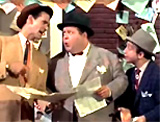
Horse-Betters: "Fugue for Tinhorns"

Sgt and Save-A-Soul Mission Sister Sarah Brown (Jean Simmons): "Follow the
Fold"
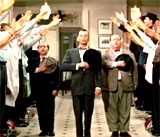
Nathan With His Cohorts, Singing: "The Oldest Established
(Permanent Floating Crap Game)" in New York
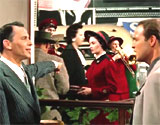
Sky's Bet with Nathan - A Havana Dinner Date with Sister Sarah Brown
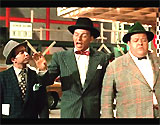
"Guys and Dolls"
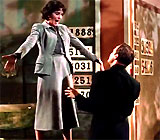
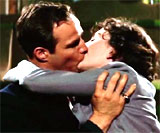
"If I Were a Bell"
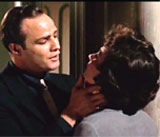
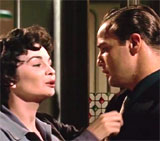
Sky and Sarah: "A Woman in Love"
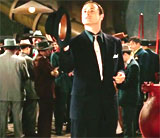
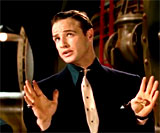
Sky Singing "Luck Be a Lady" Before His Risky Dice-Roll Bet
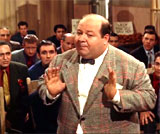
Nicely-Nicely: ("Sit Down, You're Rockin' the Boat")
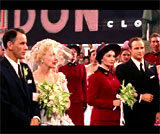
Double-Wedding in Times Square
|
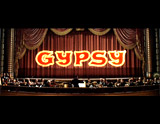
|
Gypsy (1962)
This screen version of the 1959 Broadway musical play
(starring Ethel Merman) by Warners -- with a Jule Styne-Stephen Sondheim
score -- was suggested by the lives of the Hovick family:
- bullying and domineering mother, Mama Rose Hovick
(Rosalind Russell, singing voice of Lisa Kirk)
- Louise Hovick (Natalie Wood as older, Diana Pace
as younger), an ecdysiast-actress later known as Gypsy Rose Lee
- Louise's younger sister 'Baby' June Hovick (Suzanne
Cupito/Morgan Brittany)
- older 'Dainty' June (Ann Jillian)
The
most memorable number was belted out by the Mama Rose character
to Louise at a train station -- Everything's
Coming Up Roses (pictured): ("You'll be swell, you'll be
great, Gonna have the whole world on a plate").
Another was
the wild and funny You Gotta Have A Gimmick (pictured) performed
by a trio of Minsky's burlesque house strippers Electra (Roxanne Arlen),
Tessie Tura (Betty Bruce) and Mazeppa (Faith Dane) to fresh-faced Louise
Hovick - aka Gypsy Rose Lee on how to be a successful and innovative
stripper and get applause: ("...If you wanna make it
Twinkle while you shake it If you wanna grind it Wait till you refined
it If you wanna bump it Bump it with a trumpet So get yourself a gimmick
And you too can be a star!").
Another memorable moment was Louise's debut stage performance
of Let
Me Entertain You (pictured), after she was introduced as "Gypsy
Rose Lee,"
and she made a nervous appearance on stage before an all-male audience
in an elegant blue dress - and used Mama's vaudeville trademarks
as Mama stood and coached off-stage and yelled tips. Gypsy teasingly
removed a long white glove as she asked the audience: "Hello
everybody, my name is Gypsy! What's YOURS?", and then teasingly
offered:
"We'll have a real good time."
There was also a montage of future performances,
exhibiting Gypsy's significantly improved stage show with a deeply
sensual subtext, more stylish peekaboo stripping and costuming, and
her trademark line to the audience: ("Hello
everybody, my name is Gypsy! What's YOURS?"). The montage
ended with Gypsy's introduction at Minsky's - headlined by "The
Queen of Striptease" who again performed: "Let Me Entertain
You" - "We'll
have a real good time!" - and gave a semi strip-tease behind
a curtain. |
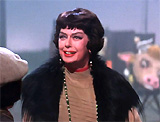
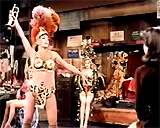
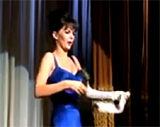

|
